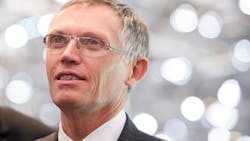Doubling of Peugeot Boss Salary 'Harmful,' Says France Finance Minister
PARIS - A decision by PSA Peugeot Citroen (IW 1000/58) to double its chairman's salary to 5 million euros has sparked angry debate in France, with Finance Minister Michel Sapin on Tuesday qualifying the raise as "harmful."
Carlos Tavares, the chairman of Europe's second biggest carmaker, earned 5.24 million euros (US$5.8 million) in 2015, up from 2.75 million in 2014, company documents showed last week.
The company's supervisory board hailed Tavares for leading Peugeot through a restructuring process that moved it back into the black in 2015 with a net profit of 1.2 billion euros.
As criticism rose over the move, Sapin said the government, which has a 13% stake in the company, asked its representatives to vote against the salary increase.
Sapin told France Inter radio that if the state had a greater share "it would have been blocked."
He also said that at a time when France's economy is faltering, the increase "is harmful, everyone can see it."
"We are in a time when we need to make an effort, and it needs to be more or less shared. I say more or less because we are talking about figures that are so huge that one can barely comprehend what they mean."
When the salary increase was announced Friday, the CFDT labor union slammed it as a decision which "causes a lot of damage to social cohesion," adding that Peugeot employees had also played a role in turning the company around.
The company has said it would be paying out an average 2,000-euro bonus to French-based employees as a reward for the strong results.
Under Tavares' leadership Peugeot experienced a massive turnaround after posting a 555 million euro loss in 2014.
Pierre Gattaz, head of the Medef employers' association, defended the move, saying: "When there is success, it does not shock me that we reward success."
He said company leaders "are heroes."
The head of the PSA supervisory board Louis Gallois said the salary increase was "not at all disproportionate."
Copyright Agence France-Presse, 2016
About the Author
Agence France-Presse
Copyright Agence France-Presse, 2002-2025. AFP text, photos, graphics and logos shall not be reproduced, published, broadcast, rewritten for broadcast or publication or redistributed directly or indirectly in any medium. AFP shall not be held liable for any delays, inaccuracies, errors or omissions in any AFP content, or for any actions taken in consequence.
